Aware | APC | Arbitration and Mediation Work ... - Abreu Advogados
Aware | APC | Arbitration and Mediation Work ... - Abreu Advogados
Aware | APC | Arbitration and Mediation Work ... - Abreu Advogados
Create successful ePaper yourself
Turn your PDF publications into a flip-book with our unique Google optimized e-Paper software.
aware<br />
Newsletter 45<br />
December | 2010<br />
Litigation Practice Area<br />
arbitration <strong>and</strong> mediation workgroup<br />
The waiver of appeal in the arbitration<br />
agreement | 1-3<br />
Tax <strong>Arbitration</strong> | 5-6<br />
The Enforceability of Mediated Settlement<br />
Agreements in Portugal | 3-5<br />
Jurisprudence | 7-9<br />
EDITORIAL<br />
We are pleased to present the Second Edition of the<br />
<strong>Arbitration</strong> & <strong>Mediation</strong> <strong>Aware</strong>.<br />
This time the members of the Department of <strong>Arbitration</strong><br />
<strong>and</strong> <strong>Mediation</strong> (GAM) have dedicated their time<br />
to the analysis of (i) a recent Supreme Court ruling<br />
- in a case where <strong>Abreu</strong> <strong>Advogados</strong> represents one<br />
of the parties - that elaborates on the party’s sui generis<br />
renounce to the right to appeal the award; (ii)<br />
the potential change of perspective that may soon<br />
take place in Portugal regarding the arbitrability of<br />
tax disputes <strong>and</strong> (iii) the enforceability of mediated<br />
settlement agreements in Portugal.<br />
Finally, we shall include a highlight with some of the<br />
most recent <strong>and</strong> relevant jurisprudence in domestic<br />
arbitration.<br />
We hope you enjoy this <strong>Aware</strong> <strong>and</strong>…Merry Christmas!<br />
Pedro Sousa Uva | Associate Lawyer
aware<br />
The waiver of appeal in the arbitration agreement<br />
The Supreme Court of Justice (STJ) has recently<br />
rendered a decision on a case in which we were<br />
involved, about an issue we believe to be particularly<br />
interesting in what regards the scope<br />
of arbitration clauses <strong>and</strong> the possibility for the<br />
parties to subject the arbitral decision to appeal.<br />
As we know, the Law on Voluntary <strong>Arbitration</strong><br />
(LAV), after having established the principle<br />
of non-waiver of the right to annul an arbitration<br />
award 2 , expressly admits that the parties<br />
can renounce, in absolutum, to recourse against<br />
the award, <strong>and</strong> states, secondarily, that final<br />
decisions issued by the Arbitral Tribunal can be<br />
appealable, in the same cases where an appeal<br />
would be admissible before a Court of Appeals for<br />
a decision that was rendered by a district Court 3 .<br />
would result in the violation of the principle of<br />
legality with regards to appeals, access to justice,<br />
<strong>and</strong> effective judicial protection, as defended<br />
the Claimants, but rather with an issue<br />
of good interpretation of the will of the parties,<br />
under the terms of articles 236º <strong>and</strong> 238º<br />
of the Civil Code, in accordance to which it results<br />
that, in casu, these Parties had provided<br />
only one exception to the regime of non-waiver<br />
stated in the afore-mentioned procedural rules.<br />
In other words, as regards the waiver of appeals<br />
that necessarily results from the submission<br />
of the dispute to the Centro de Arbitragem<br />
Comercial, the parties intended <strong>and</strong> declared<br />
to exclude the possibility of appeal before the<br />
Court of Appeals of Lisbon, admitting the challenge<br />
of an appellate decision against the award.<br />
Concerning the case that was examined by the<br />
STJ, the parties had contracted to submit any<br />
future dispute to an Arbitral Tribunal under the<br />
terms of the Procedural Rules of the Centro de<br />
Arbitragem Comercial da Câmara de Comércio<br />
e Indústria Portuguesa, which state that arbitral<br />
awards are not appealable. However, the parties<br />
had provided the possibility of appeal against the<br />
award in the arbitration clause, establishing the<br />
possibility of an “appeal before the Court of Appeals<br />
of Lisbon, under the terms set in the Civil<br />
Procedure Code for the appeal on the merits”. Subsequently,<br />
not accepting the decision rendered by<br />
the arbitrators, the Defendant appealed, <strong>and</strong> the<br />
case was decided favourably by the Court of Appeals<br />
of Lisbon. In light of this appellate decision,<br />
the Claimants, in turn, appealed for review before<br />
the STJ, <strong>and</strong> after having been initially admitted<br />
by the Court of Appeals, the appeal proceeded to<br />
be deemed inadmissible by the STJ, first by the<br />
report of the Supreme Court Rapporteur, then,<br />
by a collective decision of the Supreme Court.<br />
(continues on page 3)<br />
The reasoning of the STJ is quite assertive when<br />
considering, as argued by the Defendant, that<br />
they were not faced with an exception, decided<br />
according to the will of the parties, to imperative<br />
norms related to appellate procedures, which<br />
1. Law n.º 31/86, of August 29<br />
th<br />
2. Article 28º, n.º1: The right to request the annulment of the arbitral award cannot be waived.<br />
3. Article 29º, n.º1: If the parties have not renounced to the right to appeal, the same recourses are available for an arbitral<br />
award to be appealed before a Court of Appeals than those available for a district court decision.<br />
www.abreuadvogados.com<br />
2<br />
2
aware<br />
The waiver of appeal in the<br />
arbitration agreement<br />
(continuaTION)<br />
The parties have not declared the setting aside of<br />
the norm contained in the Procedural Rules which<br />
provided for the renunciation of appeals with the<br />
selection <strong>and</strong> application of the Arbitral Tribunal,<br />
nor does this appear in any element of the “Contract”<br />
or of the case file. Therefore, it was decided<br />
that the wording of the arbitration clause is unequivocally,<br />
which, according to the express will<br />
of the parties, should be interpreted in the sense<br />
that the arbitral award shall only have one degree<br />
of appeal, which is before the Court of Appeals<br />
of Lisbon, with the inherent inadmissibility of<br />
an appeal for review before the Supreme Court.<br />
What we should retain from this decision is the<br />
underst<strong>and</strong>ing, already behind the Latin phrase<br />
cui licet quod est plus, licet utique quod est minus,<br />
that if it is admissible for the parties to renounce,<br />
in absolutum, to any right of appeal against an arbitral<br />
award, it is also permitted for them to limit,<br />
through the arbitration clause, the degree of appeal<br />
they intend to subject the arbitration award to.<br />
This underst<strong>and</strong>ing supports the objective pursued<br />
by the parties to an arbitration clause: the balance<br />
between a faster process leading to a final decision,<br />
thus opting to submit the dispute to the Arbitral<br />
Tribunal, <strong>and</strong> justice by a reviewed decision<br />
based on the merits, allowing that another jurisdiction<br />
pronounces itself on these same merits.<br />
THE Enforceability of<br />
Mediated Settlement<br />
Agreements in Portugal<br />
One of the main elements that differentiates mediation<br />
from litigation or arbitration is the enforceability<br />
of the outcome. Indeed, both court decisions<br />
<strong>and</strong> arbitral awards enjoy a level of enforceability<br />
which comforts parties who oftentimes want closure<br />
almost as much as a favourable outcome. This<br />
is due to the fact that for both these adjudication<br />
procedures, the law grants the necessary legal<br />
effectiveness to have such outcomes executed.<br />
Mediated settlement agreements unfortunately<br />
merely consist in private agreements signed between<br />
the parties to a dispute, <strong>and</strong> therefore lack<br />
the legal effect that would allow them to be directly<br />
executed. This loophole may sometime be<br />
problematic, as in most cases, the parties to the<br />
dispute have significant trust issues, which are<br />
frequently, in the conflict situation at h<strong>and</strong>, due to<br />
the breach by one party of its contractual obligations.<br />
Those in disfavour of mediation would thus<br />
find an easy argument in the question: “How can<br />
one party be sure that the other will respect the<br />
settlement agreement when a breach of contract is<br />
what brought them to mediation in the first place?”<br />
In face of this pertinent question, three points<br />
must be analysed to explain the enforceability of<br />
mediated settlement agreements under Portuguese<br />
law.<br />
Alex<strong>and</strong>ra Nascimento Correia | Associate Lawyer<br />
alex<strong>and</strong>ra.n.correia@abreuadvogados.com<br />
(continues on page 4)<br />
www.abreuadvogados.com<br />
3<br />
2
aware<br />
THE Enforceability of Mediated Settlement Agreements in<br />
Portugal (continuaTION)<br />
Firstly, there is a way to give a mediated settlement<br />
agreement a greater level of enforceability<br />
than that of a private contract, by having it respect<br />
the legal requirements of article 46º of the<br />
Civil Procedure Code (CPC), which would automatically<br />
confer it the status of “enforceable title”.<br />
The relevant requirements to be met for the<br />
agreement to be granted the status of an “enforceable<br />
title” are found in nº 2 <strong>and</strong> 3 of the<br />
afore-mentioned article, which respectively<br />
state that can serve as such titles “the specific<br />
documents, signed by the debtor, which contain<br />
the constitution or the recognition of pecuniary<br />
obligation, the amount of which must be<br />
determined or determinable by simple arithmetic<br />
calculation as established in its provisions,<br />
or an obligation to deliver a thing or to perform<br />
an act”, or “the documents which, by a special<br />
provision, are attributed enforceable force”.<br />
According to the wording of the law, it does not<br />
seem difficult to have a settlement agreement<br />
meet the requirement stated above, since such<br />
agreements usually contain the constitution or<br />
recognition of a pecuniary obligation, but may<br />
also include an obligation to deliver or to perform<br />
obligations which are aimed at permitting<br />
the final resolution of the dispute. Moreover,<br />
for the sake of reinforcing the qualification<br />
of the settlement agreement as an enforceable<br />
title, the parties can additionally include<br />
a clause within the agreement stating that the<br />
parties attribute enforceable force to the document,<br />
as per nº 3 of article 46º of the CPC.<br />
Number 3 of the same article adds that “the<br />
judicial confirmation of the agreement obtained<br />
in pre-trial mediation aims at verifying<br />
its conformity with the current legislation”.<br />
The confirmation therefore entails two major aspects,<br />
the first being that the parties are free to<br />
choose whether or not to have the settlement<br />
agreement confirmed, <strong>and</strong> the second being that<br />
through this confirmation, the court might refuse<br />
to give it the power of a court decision if it deems<br />
it to be contrary to the current legislation in force.<br />
Concerning this second point, which is the most<br />
interesting one, it is important to mention that<br />
if the parties decide to have the settlement<br />
agreement confirmed by a judge, it will have<br />
the same legal effectiveness as a court decision<br />
of first instance, provided of course it is<br />
validated by the said judge. The parties will be<br />
left with an agreement which they have drafted,<br />
which is tailored to their needs <strong>and</strong> interests,<br />
which they overall believe to be an acceptable<br />
manner to resolve the dispute, <strong>and</strong> which<br />
will have the same force as a judicial ruling.<br />
The parties are therefore no longer bound only by<br />
a mere contractual agreement, which they would<br />
have been free to breach, but are faced with obligations<br />
that have the recognition <strong>and</strong> authority<br />
of a court decision, which plays a significant role<br />
both in the personal <strong>and</strong> practical approach to<br />
how the agreement will be fulfilled by the parties,<br />
<strong>and</strong> adding a powerful incentive to respect it.<br />
The result of having been conferred the status of<br />
enforceable title will permit the parties to have<br />
the obligations contained therein enforced before<br />
a court under a specific procedure called “executive<br />
action”, which is a much faster, less costly<br />
<strong>and</strong> simple procedure with limited grounds for opposal,<br />
thus ensuring an additional protection for<br />
the enforceability of the settlement agreement.<br />
The second way to give a mediated settlement<br />
agreement in Portugal is to have it confirmed<br />
by a judge, in accordance with article 249-Bº<br />
of the CPC. Indeed, this provision statesthat “If<br />
the mediation results in an agreement, the parties<br />
may dem<strong>and</strong> its confirmation by a judge.”<br />
www.abreuadvogados.com<br />
(continues on page 5)<br />
4<br />
2
aware<br />
THE Enforceability of Mediated<br />
Settlement Agreements in<br />
PORTUGAL (continuaTION)<br />
It must be noted however that by submitting the<br />
mediated settlement agreement to a judge for<br />
confirmation, the parties relinquish their right to<br />
having the agreement remain confidential, as it<br />
will take on the same public status as a court decision.<br />
The parties therefore will have to make a<br />
choice, either to keep the agreement confidential<br />
<strong>and</strong> risk that the obligations included therein being<br />
breached, or to give up the confidentiality of<br />
the content to the benefit of granting a higher degree<br />
of legal force to the settlement agreement.<br />
The final point that needs to be discussed concerning<br />
the enforceability efficiency of mediated<br />
settlement agreements is that most often, the<br />
fact that the parties have concluded the agreement<br />
themselves is sufficient enough incentive<br />
for them to comply with their obligations contained<br />
within. Indeed, by empowering the parties<br />
in deciding on the outcome or their dispute,<br />
<strong>and</strong> giving them the possibility, from the start of<br />
the process, to refuse or accept certain provisions<br />
or certain others, it truly makes them feel that<br />
they are involved more personally with the result,<br />
which is, in effect, their own solution to their problem,<br />
based on their information <strong>and</strong> on what they<br />
are supposedly willing to do to achieve that resolution.<br />
A mediated settlement agreement represents,<br />
beyond the fact that it is a mere contract,<br />
a solution to a concrete problem that the parties<br />
have mutually negotiated <strong>and</strong> agreed to, which<br />
will benefit them both, <strong>and</strong> which they both consider<br />
to be acceptable. As such, the chances that<br />
one of the parties breaches this settlement agreement,<br />
despite that it does not have a legally binding<br />
effect as a court decision does, are very low.<br />
Overall, mediated settlement agreements in general<br />
are usually respected by the parties, due to<br />
their intrinsic characteristics, but if the parties<br />
wish to give these agreements additional binding<br />
power, they may choose to do so under the provisions<br />
of the Civil Procedure Code, either by granting<br />
the agreement the status of an “enforceable<br />
title”, or by confirming it before a judge.<br />
Tax <strong>Arbitration</strong><br />
After months of expectation, the Council of Ministers<br />
has approved, last November 11th, the<br />
statute that will create <strong>and</strong> regulate tax arbitration<br />
as an alternative means to judicial litigation.<br />
We are now waiting, with even greater expectation,<br />
the approval of the statute by the Assembly<br />
of the Republic <strong>and</strong> its subsequent publication.<br />
<strong>Arbitration</strong>, as an alternative mean to judicial litigation<br />
on tax matters, was defined after the legislator<br />
granted the Government, through Law 3-B<br />
/2010, of April 28, which approved the State’s Budget<br />
for 2010, powers to draft a law on Tax <strong>Arbitration</strong>,<br />
thus accepting the proposals in the Report of<br />
the Group for the Study of Tax Policy Competitiveness<br />
Efficiency, <strong>and</strong> Justice of the Tax System 1 .<br />
Idealistically <strong>and</strong> according to the general lines<br />
drawn in the said legislative delegation, the arbitration<br />
procedure for tax litigation shall have two<br />
main purposes: i) more celerity in discussing <strong>and</strong><br />
deciding litigation between taxpayers <strong>and</strong> the Tax<br />
Administration <strong>and</strong> ii) the relief of judicial Courts.<br />
In fact, the arbitration award shall be rendered<br />
within a maximum of six months, which may be extended<br />
for similar period whenever justified. This<br />
one point presents itself as a huge progress for judicial<br />
procedure, where so many times one awaits<br />
a decision that, most of the times, comes late,<br />
therefore implying significant costs to taxpayers.<br />
(continues on page 6)<br />
Thomas Gaultier | Of Cousel with <strong>Abreu</strong> <strong>Advogados</strong><br />
thomas.gaultier@abreuadvogados.com<br />
1. Report of the Group for the Study of Tax Policy Competitiveness Efficiency <strong>and</strong> Justice of the Tax System, under the<br />
general coordination of António Carlos dos Santos <strong>and</strong> António M. Ferreira Martins <strong>and</strong> coordination of the subgroups by<br />
João Amaral Tomaz, Rui Morais, Sidónio Pardal, António Nunes dos Reis <strong>and</strong> Rogério M. Fern<strong>and</strong>es Ferreira, page 654 <strong>and</strong><br />
www.abreuadvogados.com<br />
5<br />
2
aware<br />
Tax <strong>Arbitration</strong> (continuaTION)<br />
Of the very little we know from the legislative<br />
delegation granted to the Government, the arbitration<br />
procedure will only apply to matters that<br />
may be the object of a judicial claim <strong>and</strong> of a<br />
claim for recognition of a legitimate tax right or<br />
interest, thus excluding matters like opposition to<br />
tax enforcement procedure. However, this choice<br />
from the legislator seem odd, as an opposition to<br />
tax enforcement procedure is, in fact, one of the<br />
tax procedures where the celerity of rendering an<br />
award becomes more important.<br />
Still, there are two issues that may lead to discussion<br />
on this matter, particularly regarding the<br />
administrative costs <strong>and</strong> fees to be paid <strong>and</strong> the<br />
appointment of the arbitrators by the parties.<br />
So far, we know nothing on the amounts to be paid<br />
for tax arbitration, in terms of fees or administrative<br />
costs. The experience of commercial arbitration<br />
gives us an idea that these costs may not be<br />
bearable by each <strong>and</strong> every taxpayer, particularly<br />
concerning natural persons. Under the terms of<br />
the legislative delegation, the determination of<br />
the fees shall depend on the amount in discussion,<br />
on the procedure, as well as its complexity.<br />
Concerning the constitution of the arbitration<br />
Court <strong>and</strong> as a general rule, it will be tripartite,<br />
i.e., composed by three arbitrators, two appointed<br />
respectively by each party <strong>and</strong> a third arbitrator,<br />
who will be the arbitrator-president, who<br />
shall be appointed by said two.<br />
Regarding the eligibility of arbitrators, in principle,<br />
they must be legally qualified with at least<br />
10 years of known experience in tax matters.<br />
The arbitrators must be qualified as such by the<br />
Administrative <strong>Arbitration</strong> Center (CAAD), with<br />
the supervision of its Ethics Council. In what concerns<br />
the award that may be rendered, we already<br />
know that these arbitrators may only apply<br />
the existing Law, without any margin to render<br />
an award based on equity.<br />
As to the effects of the arbitration award, the fundamental<br />
rule will be that of the unavailability of<br />
an appeal, except when appealing to the Constitutional<br />
Court. Nevertheless, even an appeal to<br />
the Constitutional Court may only be accepted<br />
when <strong>and</strong> where the arbitration tribunal refuses<br />
to apply a rule based on its unconstitutionality<br />
or applies a rule, the unconstitutionality of which<br />
had been risen. Except when there is an appeal<br />
or an annulment of the award, it shall be as enforceable<br />
as any final judicial decision.<br />
Finally, still regarding the introduction of this new<br />
alternative means to tax litigation, we must point<br />
out the implementation of a transitory regime<br />
that foresees the possibility for taxpayers to submit<br />
to arbitration the tax acts that for which the<br />
decisions are pending since over two years, without<br />
having to pay the respective costs.<br />
Since this statute still has not been published, we<br />
cannot go much further than the analysis of legislative<br />
delegation to make an adequate analysis.<br />
Nevertheless, we recognise the merit of this legislative<br />
initiative but still wonder if it is the right<br />
path to settle tax litigation, as there is still so<br />
much to do.<br />
Maria Cabral de Azevedo | Associate Lawyer<br />
maria.c.azevedo@abreuadvogados.com<br />
www.abreuadvogados.com<br />
6<br />
2
aware<br />
JURISPRUDENCE<br />
I - Non violation of the principle of<br />
res judicata for an award issued by a<br />
m<strong>and</strong>atory arbitral tribunal<br />
Being the award rendered by a m<strong>and</strong>atory arbitral<br />
tribunal a real ruling <strong>and</strong> not an interim measure<br />
for determining damages (arbitramento), then in<br />
case the award is subject to an appeal, there is<br />
no res judicata effect over the legal issues which<br />
were the object of such award, in casu, over the<br />
expropriation, whether as to the final decision or<br />
as to the grounds on which it relied on.<br />
This way, the grounds stated in the arbitral award<br />
have not, in themselves, res judicata effect.<br />
Thus, the conditions for the appeal to be upheld<br />
are therefore not met, regardless of the amount<br />
in dispute, when the intention to revoke the ruling<br />
rendered by the Court of Appeal has been<br />
refused.<br />
Ruling from Supremo Tribunal de Justiça (Supreme<br />
Court of Justice), October 12 th of 2010,<br />
case no..4925/07.4TBGMR.G1.S1.<br />
II - <strong>Arbitration</strong> clause <strong>and</strong> competence<br />
of the arbitral tribunal<br />
The arbitral tribunal has a conventional nature regarding<br />
it competence, being directly dependant<br />
on the will of the parties, particularly through the<br />
inclusion of an arbitration clause in the respective<br />
contract, which occurred in casu.<br />
III - Non automatic recognition of an<br />
enforcement title based on arbitral award<br />
Albeit foreign arbitral awards are directly enforceable<br />
under the terms of the New York Convention<br />
on the Recognition <strong>and</strong> Enforcement<br />
of Foreign Arbitral Awards, national legislation<br />
must be taken into account at all times. When<br />
a debt collection procedure is petitioned, based<br />
on a foreign arbitral award, there is no direct<br />
enforcement, for the revision <strong>and</strong> confirmation<br />
are distinct realities, being the confirmation<br />
subject to Portuguese Law in the matter.<br />
Ruling from the Tribunal da Relação de Lisboa<br />
(Lisbon Appeal Court), June 8 th 2010, case no.<br />
243/10.9YRLSB-7.<br />
IV - Lapse of the arbitration clause<br />
Regarding the rendering of the arbitral award,<br />
the Law on Voluntary <strong>Arbitration</strong> (LAV) provides<br />
a default period of six months, except if otherwise<br />
agreed by the parties. If the parties did not<br />
establish any term, one may not exclude that<br />
such a period will not be considered by the Rules<br />
<strong>and</strong> Statutes of the <strong>Arbitration</strong> Centre of the Portuguese<br />
Chamber of Commerce <strong>and</strong> Industry.<br />
(continues on page 8)<br />
As such, the Parties decided to give the arbitral<br />
tribunal the competence to rule on the matter.<br />
Therefore should a claim be filed before a judicial<br />
court, <strong>and</strong> provided the dilatory exception is<br />
invoked, it would represent a violation of the arbitration<br />
clause.<br />
Ruling from Tribunal da Relação de Lisboa (Lisbon<br />
Appeal Court), June 30 th of 2010, case no.<br />
2865/08.9TVLSB.L1-8).<br />
www.abreuadvogados.com<br />
7<br />
2
aware<br />
JURISPRUDENCE (CONTINUATION)<br />
According to this Regulation, the arbitral tribunal<br />
will only be constituted when all of the arbitrators<br />
have accepted the functions they have been designated<br />
for, <strong>and</strong> not at the date on which the last<br />
arbitrator was designated – as defined by the LAV<br />
-, thus determining the starting moment of the period<br />
before which the arbitral tribunal has to issue<br />
an award, as well as for the purpose of the lapse of<br />
the arbitration clause under the terms of the LAV.<br />
Ruling from Supremo Tribunal de Justiça (Supreme<br />
Court of Justice), March 4 th of 2010, case<br />
no. 1205/07.9TVPRT.P1.S1.<br />
V - Revision <strong>and</strong> recognition of arbitral<br />
awards<br />
The New York Convention on the Recognition <strong>and</strong><br />
Enforcement of Foreign Arbitral Awards prescribes<br />
that each ratifying State is to recognize the authority<br />
of arbitral awards <strong>and</strong> enforce them under<br />
the same procedural terms as national awards. In<br />
Portugal, Courts of First Instance are competent<br />
for said recognition <strong>and</strong> not the Courts of Appeal -<br />
nor are the Specialty Courts - under the terms of<br />
both the Convention <strong>and</strong> the Portuguese Law on<br />
Voluntary <strong>Arbitration</strong> (“Lei da Arbitragem Voluntária”).<br />
Such is so due to the fact that the recognition<br />
request is based on the exequatur, the mere<br />
control <strong>and</strong> revision, as it is not a means to apply<br />
the Law or even revise factual aspects, just as it<br />
is the case for the national Portuguese awards.<br />
Ruling from the Tribunal da Relação de Coimbra<br />
(Coimbra Appeal Court), January 19 th de 2010,<br />
case no. 70/09.6TBCBR.C1.<br />
(continues on page 9)<br />
www.abreuadvogados.com<br />
8<br />
2
aware<br />
JURISPRUDENCE (CONTINUATION)<br />
VI - Validly of an arbitration clause by<br />
reference <strong>and</strong> non-contentious nature of the<br />
origin of the arbitration agreement.<br />
The court has decided that in the situation where<br />
one party, which is subject to an arbitration clause<br />
through a written agreement, transfers its rights<br />
<strong>and</strong> obligations to another, the agreement to arbitrate<br />
is treated as existing by reference, as it is<br />
covered by the transferred rights <strong>and</strong> obligations<br />
originally present in the written agreement.<br />
The transferee is therefore bound to the arbitration<br />
clause, even though it did not sign the clause<br />
or the document in which it is included. In addition,<br />
the court stated that the amendment to a<br />
pension calculation could give rise to an arbitration<br />
procedure despite its non-contentious nature, as<br />
the Law on Voluntary <strong>Arbitration</strong> states that “the<br />
parties may agree to consider as included in the<br />
concept of a dispute any other matters, such as<br />
matters related to the need to make precise, to<br />
complete, to update or even to review the contracts<br />
or legal relationships which are at the origin<br />
of the arbitration agreement”.<br />
In what concerns foreign arbitral awards, whether<br />
they are rendered by an arbitral court or by an arbitrator,<br />
the general rule is that a review <strong>and</strong> confirmation<br />
of the award is necessary as grounds for<br />
enforcement – cf. no. 1 of article 49 of the CPC.<br />
However, the same provision excludes the cases<br />
for which another solution is provided for in treaties,<br />
conventions, European regulations <strong>and</strong> special<br />
laws, in a clear openness to the order <strong>and</strong> respect<br />
for international judicial cooperation.<br />
Thus, since the State of Portugal has ratified the<br />
New York Convention of June 10th 1957, <strong>and</strong> taking<br />
into consideration the provisions of its article<br />
III, the authority of an arbitral award will necessarily<br />
have to be recognized <strong>and</strong> treated as such,<br />
under the same conditions as national rulings, being<br />
therefore an enforcement title.<br />
Ruling from Supremo Tribunal de Justiça (Supreme<br />
Court of Justice), March 19 th of 2009, case no.<br />
299/09, available in Jurisprudence Compilation,<br />
Volume I/2009, pages 147 to 149.<br />
Ruling from Tribunal da Relação de Lisboa (Lisbon<br />
Appeal Court), January 13 th of 2010, case no.<br />
373/09.0TTLSB.L1-4).<br />
VII - Enforcement of foreign arbitral award<br />
Being an arbitral award a true decision, it will be<br />
considered as an enforcement title for the terms<br />
<strong>and</strong> purposes of paragraph a) of article 46 of the<br />
Civil Procedure Code, <strong>and</strong> not, as was suggested,<br />
as a document that will be given executive force<br />
by a special provision – cf. as provided in the paragraph<br />
of the same article.<br />
This <strong>Aware</strong> is not intended to be a comprehensive review of all developments in the law <strong>and</strong> practice, or to cover all aspects that are<br />
referred. Readers should take legal advice before applying the information contained in this publication to specific issues or transactions.<br />
For more information please contact us at apc.gam@abreuadvogados.com | Visit our website www.abreuadvogados.com<br />
© ABREU ADVOGADOS 2010<br />
(<br />
* )<br />
LISBON * | HEAD OFFICE OPORTO * MADEIRA *<br />
Av. das Forças Armadas, 125 - 12º Rua S. João de Brito, 605 E - 4º Rua Dr. Brito da Câmara, 20<br />
1600-079 Lisboa, Portugal<br />
4100-455 Porto<br />
9000-039 Funchal<br />
Tel.: (+351) 21 723 1800<br />
Tel.: (+351) 22 605 64 00<br />
Tel.: (+351) 291 209 900<br />
Fax.: (+351) 21 7231899<br />
Fax.: (+351) 22 600 18 16<br />
Fax.: (+351) 291 209 920<br />
E-mail: lisboa@abreuadvogados.com E-mail: porto@abreuadvogados.com E-mail: madeira@abreuadvogados.com<br />
WWW.ABREUADVOGADOS.COM<br />
LISBON<br />
OPORTO<br />
MADEIRA<br />
ANGOLA (IN ASSOCIATION)<br />
2<br />
MOZAMBIQUE (IN ASSOCIATION)


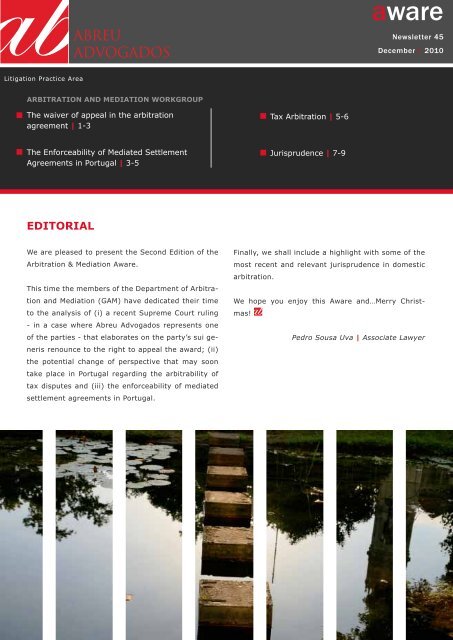
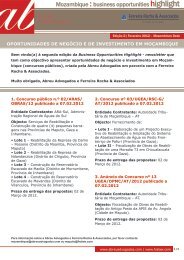

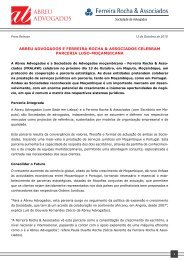


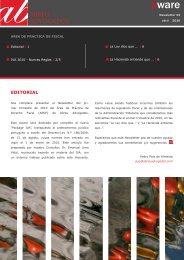
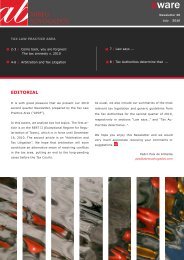
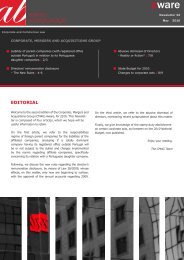



![Relatório de Sustentabilidade 2009-2010 [PDF] - Abreu Advogados](https://img.yumpu.com/24770942/1/190x247/relatario-de-sustentabilidade-2009-2010-pdf-abreu-advogados.jpg?quality=85)


